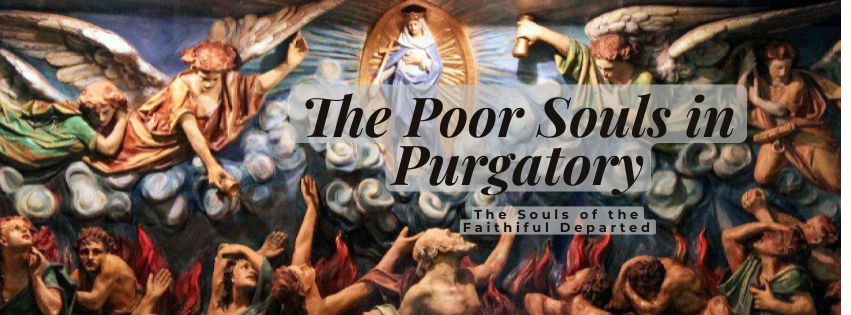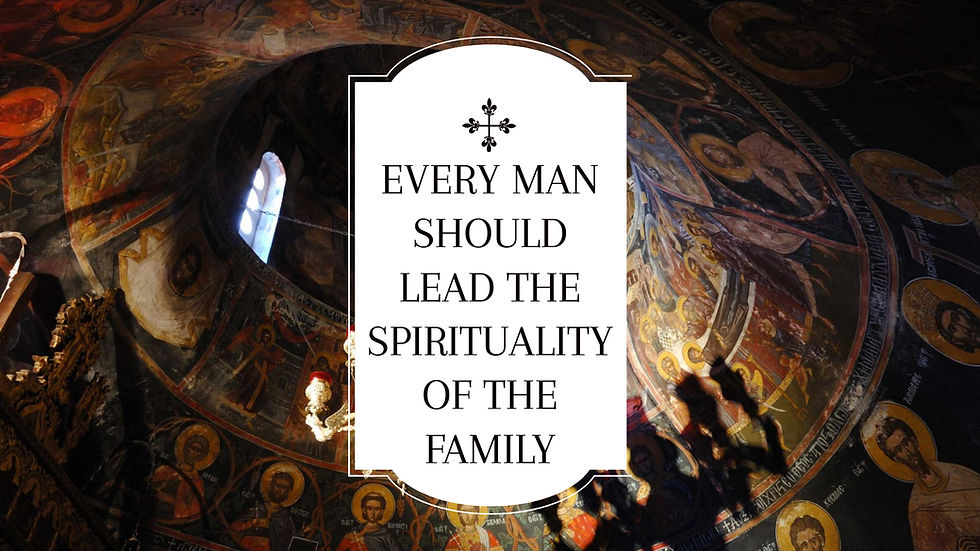What Is Purgatory? What Happens to the Soul After Death?
- Holy Innocents School

- Nov 5, 2025
- 6 min read

Eternal rest grant unto them, O Lord, and let perpetual light shine upon them. May the souls of all the faithful departed, through the mercy of God, rest in peace. Amen
Among the truths taught by the Holy Catholic Church from her earliest days is the consoling and reasonable doctrine of Purgatory. Both faith and reason tell us that there must be a middle ground where souls destined for the glory of heaven are purified from all stain of sin. Sacred Scripture declares: “There shall not enter into it anything defiled” (Apoc. 21:27). Yet, at the same time, the mercy of God allows the sinner who dies in His grace to be saved, even though justice still requires satisfaction for sins already forgiven.
Purgatory, therefore, is not a place of despair. It is a place of hope, a place of loving purification, where souls are prepared for everlasting union with God.

What is purgatory?
Purgatory is a place of temporary punishment for those who have died in the state of grace, but have not fully satisfied God’s justice for all punishment due their sins.
Purgatory is a middle state where souls destined for heaven are detained and purified. Souls in purgatory cannot help themselves, for their time for meriting is past. But they can be helped by the faithful on earth, by prayers and other good works.
Belief in the utility of praying for the dead automatically includes belief in the existence of purgatory. If there were no purgatory, it would be useless to pray for the dead, because saints in heaven need no help, and those in hell are beyond aid.
Purgatory is a place of temporary punishment for those who have died in venial sin, or who have not fully satisfied God’s justice for mortal sins already forgiven.
The doctrine of purgatory is eminently consoling to the human heart. It consoles us when our loved ones die. Purgatory is a bond of union making us realize that death is not an eternal separation for the just, but only a loss of their bodily presence.
Purgatory gives us an assurance that we are united with the departed; we know that we are still in touch with them, and we can still help them.

What pains do the souls in purgatory suffer?
The souls in purgatory suffer from a great longing to be united to God, and from other great pains.
Their chief pain is the deprivation of the Beatific Vision, the vision of God in the glory of heaven. This temporary deprivation is a most severe punishment, because the poor souls already have a full knowledge of what they are missing.
“As the hart panteth after the fountains of water, so my soul panteth after thee, O God! my soul hath thirsted after the strong living God; when shall I come and appear before the face of God?” (Ps. 41:2, 3)
The general tradition of the Church is that they also suffer acutely in other ways.
St. Augustine believes that the sufferings of the poor souls are greater than the sufferings of all the martyrs. St. Thomas believes the least pain there is greater than the greatest on earth.
The greatness and the duration of a soul’s sufferings in purgatory vary according to the gravity of the sins committed. One who has lived a long life of sin, but is saved from hell only by a deathbed repentance, will stay in the purging fires of purgatory longer, and suffer there more intensely than a child, who has committed only the venial sins of an ordinary child.
That some souls stay long in purgatory is implied by the fact that the Church puts no limit to the offering of Masses for the dead; some foundations have been going on for centuries, offered for the repose of certain souls. St. Augustine believes that those stay longest in purgatory who have loved the goods of earth more. Some saints have held that certain holy souls in purgatory suffer no pain except their exclusion from the vision of God.
St. Francis de Sales says that souls in purgatory suffer most in those things in which they sinned most; as the “Imitation of Christ” says: “In what things a man hath most sinned, in those things shall he be most grievously tormented.”
The poor souls, however, have much to console them. They are certain of salvation and the love of God. They are free from temptation; they cannot commit the slightest sin, even of impatience.
They have no worry, anxiety, or distress of mind, for they are aware of deliverance. They are comforted by the prayers of the angels and saints, and of the people on earth.
Yet, the Souls in Purgatory Are Not Without Consolation
Their consolation is greater than their pain:
They are certain of salvation.
They are safe from sin and temptation.
They suffer willingly and lovingly, for they desire to be purified.
They are comforted by the prayers of the Church, angels, saints, and the faithful.
They have no fear, no confusion, no doubt. Their suffering is united to perfect love.
Can the Souls in Purgatory Help Us?
Yes. Although they cannot merit for themselves, the souls in Purgatory intercede for those who pray for them. No devotion is more blessed than devotion to the Holy Souls. The one who prays for them will never lack their intercession.
How We Can Help the Holy Souls
In what ways can we help the poor souls in purgatory? — We can help the poor souls in purgatory by Masses, by prayers, and by other good works.

Masses. The Holy Sacrifice is the greatest help we can offer, because its effect depends on itself, and not on the piety of the priest who offers it. Whenever possible, Gregorian Masses should be offered; these consist of thirty Masses celebrated on consecutive days for some deceased person.
If we cannot have a Mass said, we should at least hear Mass for our dear departed. A Mass has infinite merit, for it is the sacrifice of Our Lord Himself. It will surely avail our dead to offer for them God the Son Himself in Holy Mass.
Prayers. We should pray with devotion for the poor souls. God does not regard the length of the prayer or the words so much as the love in the heart of the one who prays.
There are special prayers and indulgences, applicable to the souls in purgatory. We should also receive the Sacraments of Penance and the Holy Eucharist for the poor souls. “Know ye that the Lord will hear your prayers if you continue in perseverance!” (Judith 4:11)
Alms-giving. No pompous funeral or profusion of flowers is of any avail for the poor souls in purgatory. As St. John Chrysostom says, “Not by weeping, but by prayer and almsgiving are the dead relieved.”
It is better to give to charity the money spent on idle and worldly show, which cannot help the poor souls. Instead of sending costly wreaths to the family of a dead friend, it is an excellent custom instead to have Masses offered for his soul.
The Heroic Act. By this Act a person surrenders, in behalf of the souls in purgatory, all the satisfaction made up by him by his good works, including whatever satisfaction may be offered for him by others during his life and after.
The Heroic Act is enriched with precious favors. One who makes the Act and every indulgence gained to the poor souls in purgatory. He may gain a plenary indulgence applicable only to the poor souls: (1) each time he receives Holy Communion; (2) every Monday by hearing Mass in behalf of the poor souls. To gain these indulgences, he must pray in church for the Pope’s intentions.
It is an error to suppose that one who gives up his merits, or offers prayers and good works for the poor souls, thereby loses something for himself.
Prayer confers a blessing not only on the prayed for, but also on him who prays. “Blessed are the merciful, for they shall obtain mercy.”
We should not, however, rely too much on the prayers and sacrifices that our relatives may offer for us after our death. Even granting that they will remember us often and fervently in prayers, it is nevertheless true that works offered in suffrage for souls avail them only to a limited extent.
God gives more value to a little voluntary penance done here on earth than to disciplines offered for that soul after death. As a Saint aptly said, “One Mass devoutly heard during life is worth more than a great sum left for the celebration of a hundred Masses after death.”
Will All Souls in Purgatory Go to Heaven?
Yes. Every soul in Purgatory will one day enter Heaven. Purgatory ends at the General Judgment. It is a place not of despair, but of purification and hope.
Purgatory Is a Doctrine of Love
The doctrine of Purgatory consoles the human heart. It teaches us that death does not sever the unity of the Mystical Body. We remain united with the departed, and we can help them. And they, in turn, intercede for us.
To pray for the dead is an act of mercy.To forget them is an act of neglect.
Blessed are the merciful, for they shall obtain mercy.
Eternal rest grant unto them, O Lord, and let perpetual light shine upon them. May the souls of all the faithful departed, through the mercy of God, rest in peace. Amen




Comments